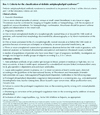Antiphospholipid syndrome: an overview
- PMID: 12821621
- PMCID: PMC161613
Antiphospholipid syndrome: an overview
Abstract
Antiphospholipid antibodies are a heterogeneous group of autoantibodies that are detected by immunoassays and functional coagulation tests. The antigenic targets are negatively charged phospholipids and serum phospholipid-binding proteins. The latter antibodies are frequently associated with thrombosis, fetal loss and other clinical manifestations of the antiphospholipid syndrome. These antibodies are felt to be etiologically important in the syndrome, although the precise pathogenic mechanisms are still being determined. Proposed mechanisms include antibody-mediated interference with coagulation homeostasis, activation of platelets and endothelial cells and a T-cell immune response to serum phospholipid-binding proteins. The mainstay of therapy is anticoagulation, whereas immunosuppression is ineffective.
Figures
References
-
- McNeil HP, Chesterman CN, Krilis SA. Immunology and clinical importance of antiphospholipid antibodies. Adv Immunol 1991;49:193-280. - PubMed
-
- Krilis SA, Hunt JE. Immunology of antiphospholipid antibodies. In: Panayi GS, editor. Immunology of connective tissue diseases (Immunology and Medicine series). Boston: Kluwer Academic; 1993. p. 279-304.
-
- Roubey RA. Autoantibodies to phospholipid-binding plasma proteins: a new view of lupus anticoagulants and other “antiphospholipid” autoantibodies. Blood 1994;84:2854-67. - PubMed
-
- Love PE, Santoro SA. Antiphospholipid antibodies: anticardiolipin and the lupus anticoagulant in systemic lupus erythematosus (SLE) and in non-SLE disorders. Prevalence and clinical significance. Ann Intern Med 1990;112:682-98. - PubMed
-
- Cines DB, McCrae KR. The antiphospholipid-protein syndrome. J Clin Immunol 1995;15:86S-100S. - PubMed
Publication types
MeSH terms
Substances
LinkOut - more resources
Full Text Sources
Other Literature Sources
Medical




